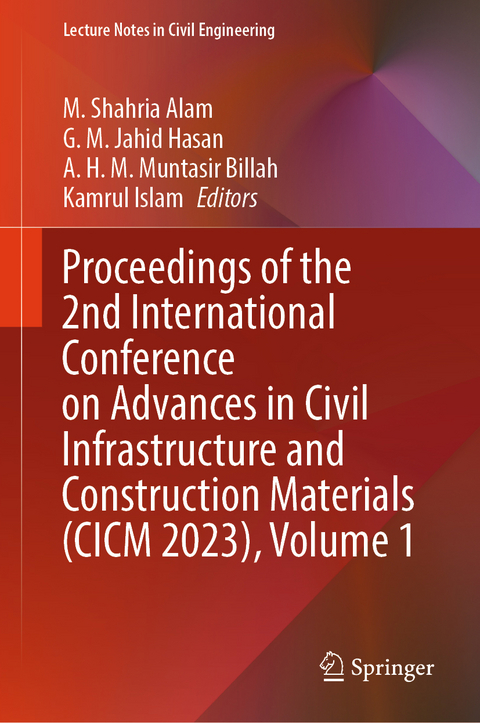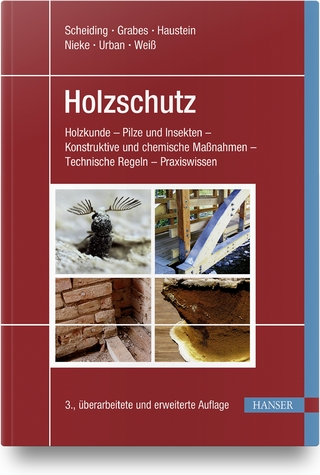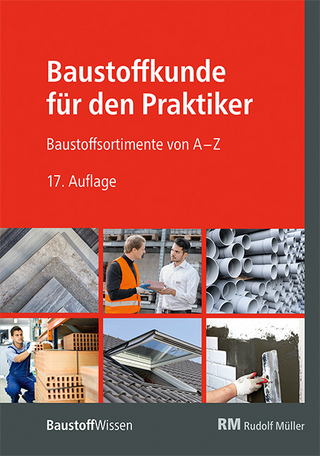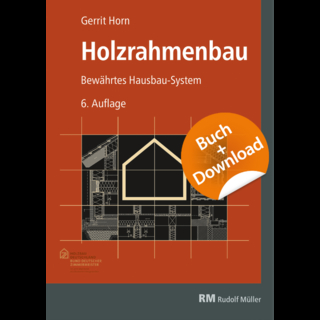
Proceedings of the 2nd International Conference on Advances in Civil Infrastructure and Construction Materials (CICM 2023), Volume 1
Springer International Publishing (Verlag)
978-3-031-63275-4 (ISBN)
- Noch nicht erschienen - erscheint am 29.09.2024
- Versandkostenfrei innerhalb Deutschlands
- Auch auf Rechnung
- Verfügbarkeit in der Filiale vor Ort prüfen
- Artikel merken
This book presents select proceedings of the International Conference on Advances in Civil Infrastructure and Construction Materials (CICM) and provides a compendium of cutting-edge research and innovative solutions in civil engineering from around the world. This book covers a diverse range of topics from seismic resilience and smart infrastructure technologies to novel construction materials and sustainable design practices. The papers discuss the application of shape memory alloys and innovative bracing systems designed for enhanced seismic resilience; delve into advancements in low-calcium fly ash, geopolymer binders, and sustainable mix designs that promise lower environmental impacts; provide insights into the latest in structural health monitoring and AI applications that revolutionize maintenance and safety protocols; showcase the use of recycled materials in construction, advancements in low-carbon cementitious composites, and innovative waste treatment technologies; review detailed studies on the behavior of composite structures under various loads and the application of machine learning in predicting structural integrity; and show how civil engineering practices impact urban development, from transportation planning to disaster resilience. The information and data-driven inferences compiled in this book are therefore expected to be useful for practitioners, policymakers, educators, researchers, and individual learners interested in civil engineering and allied fields.
Dr. Shahria Alam is a professor of Civil Engineering and the Tier 1 Principal's Research Chair in Resilient & Green Infrastructure in the School of Engineering and at the University of British Columbia (UBC)'s Okanagan campus. He is serving as the director of the Green Construction Research & Training Center (GCRTC) at UBC. Dr. Alam is the Vice-President (Technical Program) of the Canadian Society for Civil Engineering (CSCE) and the past chair of the Engineering Mechanics and Materials Division of CSCE. He received his Ph.D. in Civil/Structural Engineering from Western University in 2008. His research interests include smart and recycled materials and their structural engineering applications. He has published more than 400 peer-reviewed articles in these areas. He is the recipient of numerous national and international awards including three best paper awards.
Dr. Jahid Hasan is currently working as a professor in the Civil Engineering Department of MIST since 2013. Before joining MIST, he worked from a lecturer to a professor in the Civil and Environmental Engineering Department of the Shahjalal University of Science and Technology (SUST). Dr. Hasan did his Bachelor in Civil Engineering from BUET, M.Eng. from the National University of Singapore (NUS), and Ph.D. from the University of Tsukuba, Japan. He also worked as a post-doctoral fellow in the Singapore-Delft Water Alliance. He has more than 23 years of academic, administrative, and research experience. He received the best faculty awards in 2014 and 2015 from the Commandant of MIST and also the Vice-Chancellor's award from the Vice-Chancellor of SUST in 2011 for having outstanding performance and contribution in research activities.
Dr. Muntasir Billah is an assistant professor in the Department of Civil Engineering at the University of Calgary, Canada. He received his Ph.D. in structural engineering from the University of British Columbia, Canada. Dr. Billah was awarded the 2016 UBC Governor General's Gold Medal-one of Canada's most prestigious academic awards. Dr. Billah's research has gained both national and international recognition with 53 peer-reviewed journal papers, more than 60 conference papers, and 8 invited presentations. Dr. Billah aims to amalgamate conventional engineering and the application of advanced materials and tools to devise solutions that make the infrastructures more sustainable and resilient. His research interests include performance-based seismic design and retrofit of bridges, application of high-performance materials, artificial intelligence in structural engineering, and multi-hazard resilience of infrastructure.
Kamrul Islam is a doctoral candidate in the Department of Civil, Geological, and Mining Engineering at Polytechnique Montreal, Canada. He completed his bachelor's degree in civil engineering from the Bangladesh University of Engineering and Technology (BUET) and M.Sc. in Structural Engineering from the University of Alberta. After his graduation, he worked as a research assistant in the Orthopaedic Surgery Department of the University of Alberta Hospital and the Mechanical Engineering Department of the University of Alberta. He and his team from the University of Alberta were awarded the Canadian Orthopaedic Research Society Founders' Medal for the best basic science paper based on his M.Sc. research work. Before joining Polytechnique Montreal, he served as a faculty member at the Military Institute of Science and Technology (MIST) for nearly five years where he was extensively involved in teaching, research and consulting projects.
Chapter 1: An Innovative Steel Braced Frame System for Controlled Self-Centering Elastic Seismic Response of Low-Rise Steel Building Structures.- Chapter 2: Towards Building Resilience through Reconnaissance: Artificial Intelligence Approaches for Structural Health Monitoring.- Chapter 3: Impact of Graphene Nanoplatelets in Developing a Low-Calcium Fly Ash and GGBS based Geopolymer Binder Concrete.- Chapter 4: Performance Based Concrete Mix and Cover Design in Saline Exposure: Why and How?.- Chapter 5: A Review on Compressive Strength of Masonry.- Chapter 6: Asphaltene Precipitation Optimization through Partial Dissolution Using Si-SARA Method.- Chapter 7: Influence of Fire Resilience Requirement on The Sustainability of Concrete Slabs.- Chapter 8: Shape Memory Alloys for Multi-hazard Resiliency of Highway Bridges.- Chapter 9: On the Concept of Climate-Resilient Design of Civil Infrastructure Systems.- Chapter 10: Smart Method of FRP Laminates for Shear Strengthening of RC Beam: Research to Practice.- Chapter 11: New Seismic Design Provisions in BNBC-2020: A Quick Appraisal.- Chapter 12: Cyclic Stress-Strain Model for Circular Concrete-Filled Steel Tubular Columns.- Chapter 13: Investigation of Prestressed Concrete Bridge Girders Under Overheight Vehicle Collisions.- Chapter 14: Experimental Validation of Nonlinear Finite Element Analysis of RC/PC Structures under Corrosion.- Chapter 15: Proposal for the Conceptual Structural Prototype of Emergency Shelter for the Vulnerable Rohingya Community of Coastal Camp of Bangladesh. etc.
| Erscheinungsdatum | 03.09.2024 |
|---|---|
| Reihe/Serie | Lecture Notes in Civil Engineering |
| Zusatzinfo | X, 440 p. |
| Verlagsort | Cham |
| Sprache | englisch |
| Maße | 155 x 235 mm |
| Themenwelt | Technik |
| Weitere Fachgebiete ► Handwerk | |
| Schlagworte | Challenges in Civil Infrastructure • Geotechnical Engineering • Infrastructure related to Environment and Water Resources • Innovative Materials and Structures • Performance of Construction Materials • Recycling, Reuse and Sustainability of Construction Materials • Repair, Rehabilitation and Retrofitting of Structures • Structural Condition Assessment and Health Monitoring • Structural Dynamics and Vibrations • Urban Infrastructure and Transportation Management |
| ISBN-10 | 3-031-63275-3 / 3031632753 |
| ISBN-13 | 978-3-031-63275-4 / 9783031632754 |
| Zustand | Neuware |
| Haben Sie eine Frage zum Produkt? |
aus dem Bereich


